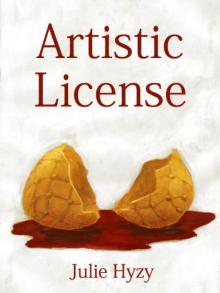- Home
- Julie Hyzy
Grace Sees Red Page 2
Grace Sees Red Read online
Page 2
Frances started to speak but stopped herself.
“Are you sure you’re okay?” I asked.
“Give me a minute, would you?”
I pulled my lips in to stop myself from asking more. On a good day, Frances could be ornery. Today, she was off the charts.
“Take your time,” I said.
“What’s wrong?” Bennett mouthed.
I shrugged and shook my head. He stepped closer and leaned in to hear.
“Okay, here it is.” Frances huffed, but spoke haltingly. “I need a favor. Can you do me a favor?”
I had no idea what this favor entailed, but I knew my assistant wouldn’t be asking for help if it wasn’t serious. “Anything, Frances. What do you need?”
Though I couldn’t see her, I could sense her relief. “I need you to come out here. I’m in Rosette.”
“Sure.” I was confused but willing to roll with it. “Where’s that?”
“It’s a small town. I’m not surprised you haven’t heard of it. I’ll give you the address. You have a pen and paper?”
“No, but I’ll record it in my phone,” I said. “Let me put you on speaker.”
Her heavy breathing was hard to miss in the few seconds it took me to pull up my mapping app. “Go ahead,” I said. “I’m ready.”
She provided an address and spelled the street name as I typed in the information and the app determined my route. “How soon can you be here?” she asked.
“My GPS estimates about an hour,” I said. “I’m leaving Marshfield now.”
“What are you doing there?” she asked. “I thought you were at home.”
“Bennett and I are walking through the—”
“He’s with you?” Her pitch rose to panic level. “And you have me on speakerphone? Is the Mister hearing all this?”
Bennett stepped closer to the phone. “Are you all right, Frances? What happened? Were you in an accident?”
She made a sound I couldn’t decipher but which clearly wasn’t an expression of joy. After a few more puffs of angry breathing, she said, “Should have known better than to ask for help.”
Bennett and I stepped past the velvet ropes to head back the way we’d come. There would be no exploring of secret rooms today. “We’re on our way, Frances,” I said.
“Both of you?” she asked.
Bennett nodded. “Both of us.”
“Swell,” she said, and hung up.
Chapter 2
I pulled out of the lot at Marshfield with Bennett in the passenger seat, surprised to see storm clouds forming in the otherwise bright sky. “She was awfully cryptic on the phone,” I said as we set off. “I wonder what’s up.”
“Apparently we’re about to find out where Frances goes on weekends,” he said. “Although it’s evident she would have preferred to keep the information from me.”
“I always thought you knew but that you didn’t think it was your place to share her secrets.”
As we sped along the local access road that led to the interstate, Bennett shook his head. “A suspicion or two. Nothing more.”
Sunday-morning traffic was light, making for an easy merge onto the expressway. “What kind of suspicions?”
Bennett smirked. “The romantic kind, of course. What better options are there? I’ve always believed that Frances spent her weekends with a gentleman friend.”
Keeping my eyes on the road, I nodded. “That’s my best guess, too. But why the cloak-and-dagger approach?” A second later, a thought hit me. “You don’t think it’s because he’s married, do you?”
“No.” Bennett bunched his lips. “At least I hope not.”
Heavy raindrops splashed my windshield, smacking out a slow, rhythmless beat. I flicked on my lights and wipers.
“There goes our sunshine,” Bennett said.
The rain velocity continued to increase. I adjusted the wipers’ tempo to keep up. “Has Frances ever been married?” I asked. “She’s so stingy with personal information that I’ve been afraid to ask.”
“Testing my memory, are you?” He frowned at the silvery, gleaming road ahead. “You need to understand that Frances came to work for us when I was in my thirties. She’s younger than I am by quite a few years, and she wasn’t always the powerhouse she is now.”
“I find that hard to believe.”
Bennett snorted. “What I mean to say is that she was originally brought on as an assistant clerk or bookkeeper, I believe. Because I was busy growing the business and she was busy with her life, she remained under my radar for a good many years.”
He shrugged. “That said, I know she has a sister in Emberstowne. They lost their parents about fifteen years ago, one right after the other. No idea if there are any other siblings.” He made a thoughtful noise, then spoke slowly. “I do seem to recall learning that Frances had been married briefly and suffered through a particularly acrimonious divorce.”
“I’m sorry to hear that. I take it she never had children?”
“No.” He sighed deeply. “I wonder if having children might have softened her outlook at all. Frances is possibly the most cynical human being I’ve ever come across.”
“Every experience and person we encounter in life helps shape us. Kids included.”
“Frances may have been an exemplary parent. Or she may have been the worst,” he said. “But we’ll never know, will we?”
I exited to my right to merge onto another expressway. “No, we won’t.”
“By the way.” Bennett raised his voice to be heard above the downpour. “How is the situation with Bruce and Scott? Have they heard any more from their landlord?”
I grimaced. “Yes, unfortunately. They’re meeting today about it. The structural issues are worse than the landlord first led them to believe. Instead of dealing with core problems over the years, apparently he’s done only the bare minimum to get by, patching things and making superficial repairs.”
“You’d never know it. Their wine shop is impeccably maintained.”
“That’s because they’ve taken on the responsibility for keeping the customer areas pristine. It’s costing them far more than it should and the landlord isn’t offering them any rebate on the rent.”
“That’s wrong,” Bennett said. “Can’t village inspectors force the landlord to make repairs?”
Road signs above let me know that we were less than five miles from our exit. “That’s exactly what’s happened. Inspectors are threatening to shutter the entire building until repairs are complete. The landlord has thirty days to comply or the shop will be closed down.”
“Thirty days? Is that long enough?”
“Hardly.” I glanced over to Bennett. “That’s barely enough time to put the contract out for bids. Tourist season starts in a couple of months and it’s almost a certainty that Bruce and Scott will lose business this year.”
“That’s a shame.”
We were silent as I exited the expressway and drove for several miles. I made a soft right onto a two-lane road.
“There’s an idea I’ve been meaning to broach with you,” I said.
“Go ahead.”
We were within ten minutes of our destination. Not nearly enough time for the discussion I had planned. “It’ll keep until the ride back,” I said.
“Fair enough.”
At the next intersection, I slowed the car to a full stop.
“I’m supposed to take a right here,” I said. “But this looks like private property.”
Two concave stone signs flanked the wide driveway on our right. Bennett read the engraved words aloud. “Indwell Estates.”
We both leaned forward to peer around the massive entranceway, but there was nothing much to see. Trees bursting with pale green buds lined a long, paved road that curved out of sight behind a forest of evergreens.
“Is this someone’s home?” Bennett asked.
“I have no idea.” I shrugged and turned the wheel. “I guess we’re about to find out.”
The gentle ride leading us deeper into Indwell property reminded me of Marshfield’s welcoming roadways. Verdant, smooth, and winding, they looked as though they could have been transplanted here, down to the small blue signs alerting us to the 15-miles-per-hour speed limit. As we progressed, however, all resemblance faded away. The number of signs and their size increased exponentially. Some offered instructions for visitors, others for doctors. Another directed ambulances to silence sirens and alarms before proceeding farther.
Two cars, both with elderly drivers at the wheel, and both traveling well under the speed limit, passed us going the opposite direction. When we approached a hilltop clearing with no one behind us, I slowed to a crawl, coming to a full stop at a vista that provided an overview of the property.
“If this is a hospital, it’s certainly a swanky one,” I said.
Six M-shaped buildings lay in the gray lowland before us, forming an enormous circle around a small, restless lake. Separated by wide stretches of rain-slicked lawns, the sprawling brick-and-stone structures reminded me of Italian piazzas, or perhaps outbuildings at an upscale resort. With their narrow, curved back sides facing the lake and wide entrances facing outward, the buildings appeared to have been designed to resemble rays of the sun.
Bennett seemed stymied as well. “It’s enormous.”
“The GPS tells us we have another two miles,” I said. “I assume our destination is that very last building. The one with its back to us.”
“This is all very odd.”
I agreed, and accelerated onto a path that ran counterclockwise around the grounds. “What in the world is Frances doing here?”
Just past the turnoff for the second-to-the-last building on our left, we encountered an orange-and-white construction sawhorse blocking the street. A rain-battered cardboard sign with a hastily drawn arrow had been duct-taped to the horse, directing us to TEMPORARY VISITOR PARKING.
We pulled into a small, packed lot tucked into a low nook next to our destination. This sign read EMPLOYEE PARKING ONLY. Shrugging, I angled into one of the few open spots. “It seems we don’t have much choice.”
Soggy, warm air rolled in when we opened our doors. The rain had stopped and the sun had returned to reclaim the sky. Temperatures had definitely climbed since we’d left Marshfield.
This building was two stories, constructed on a slope. We’d parked along the lowest level, between the southern edge of the building and its nearest neighbor. The main entrance sat up one level and faced east, or possibly northeast. I couldn’t tell for certain.
I pointed. A nearby stone stairway led up the grassy incline. “You up for walking?” I asked.
“Of course.” Bennett took a long look around, a puzzled expression on his face. “Are we sure this is the address Frances provided?”
I rechecked my phone and the GPS instructions. “This is it.”
“Then she must be here.” Bennett started for the stairs.
New mulch, wet dirt, and warm greenery combined to give the damp air an earthy freshness. I breathed deeply as I hurried along the building’s side. “Whatever this place is, it’s beautiful.”
With wings emanating from a circular hub at its center point, the brick structure featured gorgeous stone accents and clean lines. The grounds immediately surrounding the simple design included the lake behind us and a wide walking path with gardens that featured both marble statues and old-fashioned oil lamps. I wondered if the architect hadn’t been able to decide between Renaissance Florence and eighteenth-century London. It didn’t matter, however. All this, set against a distant blue-purple mountain backdrop made Indwell Estates a postcard photographer’s dream.
Even the steps we climbed were lovely, with ornate curlicue handrails. As we crested the top of the incline, I grabbed Bennett’s arm. “Uh-oh.”
He’d seen it, too. Two squad cars sat along the front sidewalk, one of them blocking an accessible entrance ramp. A coroner’s van idled behind them. Two more dark sedans—with oversized spotlights mounted next to their side-view mirrors—were parked along the far walkway.
A young, uniformed police officer leaned against the coroner’s van. The moment he spotted us, he jogged over.
“Can I see some ID?”
“What’s going on?” Bennett asked as he drew out his wallet.
“Hang on.” After a squinting study of Bennett’s information, the cop ran his index finger down a list of names in his notebook, apparently looking for a match. Finding none, he repeated the process with me. “You here to visit a patient?” he asked.
My first instinct was to explain Frances’s phone call, but at the last second thought better of it. “Yes, a visit,” I said. “What happened?”
He offered a perfunctory smile. “Steer clear of the ruckus inside and you’ll be fine.”
“Ruckus?” I asked. “Is there some emergency?”
“All clear now.” The cop waved us on.
As soon as we were out of earshot, Bennett made a low noise deep in his throat. “Let’s find Frances.”
Chapter 3
Another officer, this one heavyset and older, held up a hand as we entered the facility’s honey-hued reception area. He pointed to our left. “All visitors that way,” he said, indicating a long hallway across the circular lobby. “No exceptions.” About thirty feet to our right, yet another cop stood with his arms folded, blocking anyone from entering the east wing.
I tried to get a better look. “What’s going on?” I asked.
The cop wore an implacable expression and an air of impatience. Pointing again, he said, “That way.” He took a menacing step forward. “Either follow orders or leave. Your choice.”
I had no doubt that Frances’s phone call had something to do with the police presence here and that the answers we sought were down that blocked-off wing. Tempting though it was, I decided not to try an end run around the sentry.
“Understood,” I said, tugging Bennett’s sleeve. “We’re going.”
At the mouth of the far hallway, two women wearing bright-colored medical scrubs called to us, waving. “Over here.”
We skirted an abandoned welcome desk and crossed the chilly, spacious circle in about fifteen strides. There was no longer any doubt in my mind as to what sort of facility this was. Although traditional-style furniture clustered around the lobby fireplace and silk flower arrangements sat at the center of every end table, there were two wheelchairs and an unused IV pole outside the far elevator bank, looking as though they were waiting for a lift. This was an assisted-living facility—though an upscale one, to be sure.
“What’s going on?” I asked when we reached the two women.
The one nearest me held a clipboard close to her ample chest. Fifty-ish with angled platinum hair that came to little points at either side of her chin, she wore an unabashedly eager look as she repeatedly clicked her ballpoint pen. “Sorry for the disturbance,” she said. “We’ve had an incident.”
“We noticed,” I said. “What happened?”
“We’re not sure. Not exactly,” she said. “I mean, it might be an incident.” She stressed the word incident with a lowered voice and wide eyes. “Or it might be nothing. It’s probably nothing.”
“Cathy,” the other woman warned. “Let’s not overreact.”
“What kind of incident?” I asked.
“Nothing. Nothing.” The second woman waved the air, as though to erase what Cathy had said. “At least I hope it’s nothing.” Though this woman’s pale, lank hair was pulled back in a low ponytail, she repeatedly tucked stray strands behind her right ear. The badge hanging from her lanyard indicated her name was Debbie and that she was a nurse. “We’re not supposed to talk about it.”
Cathy waggled her head. “Give me a break.” When she turned a shoulder to her colleague I got a glimpse of her badge: aide. She whispered conspiratorially, “People die in this place all the time. But calling in the homicide cops? Yeah. That doesn’t happen every day.”
At the word homicide my stomach dropped. Bennett wrapped his fingers around my forearm. I didn’t know whether he did it to steady himself or me. “Who’s dead?” I asked.
The nurse ignored me. “Cathy, stop.” Her voice was a warning. “They told us—”
“Oh come on, Debbie,” she said in that bored, singsong cadence popular with middle-schoolers. “It’s not like I’m sharing privileged information.” She wiggled her fingers to indicate the far side of the facility. “There are half a dozen investigators here. Maybe more. Anybody can see this isn’t business as usual.”
Debbie forced a tight smile. “I’m sorry,” she said, addressing me and Bennett. “We haven’t had a lot of visitors since they evacuated the East Wing.” She rapped a knuckle against the back of Cathy’s clipboard, causing the other woman to jump. “Quit gossiping and record their names.”
“Oh, yeah,” Cathy said, and clicked her pen a few more times.
“Until they allow us back to the desk, you’ll have to sign in here,” Debbie went on. “I know, I know,” she continued, despite the fact that we hadn’t said a word, “visitors usually come and go here without all this hoopla. But until further notice, we have to take down your information before we can allow you into any residents’ rooms. But first: Who are you here to visit?”
Bennett and I exchanged a puzzled glance, which clearly had a bewildering effect on the women. “We’re not here to see a patient,” I began. “At least, I assume she isn’t one.”
Bennett chimed in. “One of our employees asked us to meet her here. Her name is Frances Sliwa.”
Debbie gave a little yelp and Cathy’s eyes nearly pulsed out of her face. She clicked her pen ferociously. “What do we do?” she asked Debbie. “Who do we call?”
My stomach jolted. “What happened?” The coffee I’d enjoyed earlier began re-percolating in my gut. “You obviously know who Frances is. Is she all right?”

 Made for Murder
Made for Murder Grace Among Thieves
Grace Among Thieves Deadly Interest
Deadly Interest Deadly Blessings
Deadly Blessings All the President’s Menus
All the President’s Menus State of the Onion
State of the Onion Grace Sees Red
Grace Sees Red Whitehouse Chef 04 - Grace Under Pressure
Whitehouse Chef 04 - Grace Under Pressure Hail to the Chef
Hail to the Chef Grace Takes Off
Grace Takes Off Grace Against the Clock (A Manor House Mystery)
Grace Against the Clock (A Manor House Mystery) Grace Cries Uncle
Grace Cries Uncle Artistic License
Artistic License Eggsecutive Orders
Eggsecutive Orders Grace Interrupted
Grace Interrupted Affairs of Steak
Affairs of Steak Fonduing Fathers
Fonduing Fathers Foreign Éclairs
Foreign Éclairs Virtual Sabotage
Virtual Sabotage Grace to the Finish
Grace to the Finish